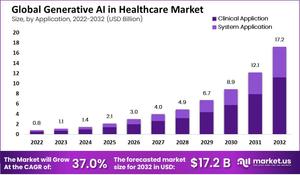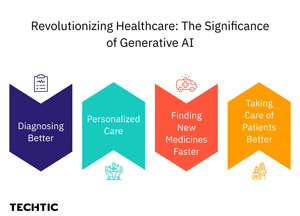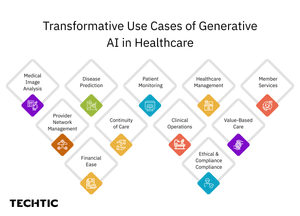Generative AI in Healthcare: Definition, Use Cases, Examples
Sector: Digital Product
Author: Nisarg Mehta
Date Published: 02/23/2024

Contents
- Definition of Generative AI in Healthcare
- Generative AI in Healthcare Market Size
- Importance of Generative AI in Healthcare
- Use Cases of Generative AI in Healthcare
- Examples of Generative AI in Healthcare
- Challenges and Ethical Considerations
- The Future of Generative AI in Healthcare
- Conclusion
The healthcare world is wrestling with big problems like not having enough staff, doctors feeling overwhelmed, making less money, and seeing health issues get worse, especially in places that don’t get enough attention. These problems need smart, new solutions to keep healthcare organizations going strong and make patient care better.
Enter generative AI technology – it’s shaping up to be a game-changer, with something to offer for big companies and regular folks alike. This tech builds on stuff like understanding natural language and learning from data (that’s NLP and ML for short), and it’s getting really good at things like creating text, summing up info, translating languages, and pulling out important insights.
The goal of generative AI is to make it easier for everyone to get the info they need, work together better, speed up scientific breakthroughs, and make healthcare more personal. It’s like we’re on the doorstep of a new era where tech gets healthcare to a whole new level.
We’re about to dive into all this cool stuff, so let’s jump in and see what’s up.
Definition of Generative AI in Healthcare
Generative AI in healthcare refers to the application of artificial intelligence models that can generate new data, insights, or content by learning from existing datasets.
This is super useful in healthcare because it means we can make fake (but realistic) patient info, tailor-made treatment plans, and even dream up new drugs. With all the health data out there, these AI programs can help figure out what might happen to patients in the future and help doctors make the best calls, making healthcare faster and more tailored to each person.
Generative AI in Healthcare Market Size
According to the Deloitte Center for Health Solutions, about 75% of top healthcare companies are either giving generative AI a test drive or planning to make it a big part of their world. And they’re serious about it—82% are setting up special teams to make sure everything’s on the up and up with generative AI.

Moreover, as per Deloitte’s 2023 Health Care Consumer Survey, they’re seeing it make things smoother (92% give it the thumbs up) and help make smart choices faster (65% are all for it). When regular folks were asked, over half (53%) said they think this tech could make getting healthcare a breeze, and almost half (46%) reckon it could make it easier on the wallet, too. Those who’ve had a taste of generative AI are even more jazzed, with 69% saying it’ll open doors to healthcare and 63% believing it’ll help save some cash.
And here’s a kicker: experts predict the cash flowing into generative AI in healthcare could balloon to $17.2 billion by 2032, shooting up from $800 million. That’s a whole lot of growth, driven by our quest for care that’s just right and the smart tech that’s getting us there.
Importance of Generative AI in Healthcare
Healthcare faces big problems today, like finding diseases too late, treatments not fitting everyone, and new medicines taking too long to come out. We need new approaches to fix these issues. Generative AI is one of those novel approaches.
The role of Generative AI in healthcare is not just about making processes faster or more efficient. It’s about making healthcare better for the people who need it and the people who work in it.

The following are the reasons why Generative AI is important for healthcare:
- Diagnosing Better: Generative AI can easily analyze a plethora of patient health data to find signs of illness that might be hard to see otherwise. This means doctors can notice diseases early and start treating them before they even show symptoms.
- Personalized Care: Generative AI uses information about a patient’s health history and what makes their body different – to suggest treatments that work better and have fewer side effects.
- Finding New Medicines Faster: Discovering new medicines usually takes significant effort in terms of money and time. Generative AI is speeding this up by guessing how different chemicals will work together. This could make it much quicker and cheaper to get new medicines to people who need them.
- Taking Care of Patients Better: The key reason we use new technologies in healthcare is to take better care of patients. Generative AI helps by giving healthcare workers tools to make smarter choices, do less paperwork, and spend more time with patients. It’s making healthcare work better, faster, and in a way that’s more focused on each patient.
Use Cases of Generative AI in Healthcare
From the back office to the operating room, Generative AI seems to greatly impact healthcare settings. Here are some of the most awaited generative AI healthcare use cases – as we’ve already discussed some of these use cases throughout the article, you can go briefly:

A. Generative AI in Healthcare - Breakthroughs
Medical Image Analysis
Generative AI transforms medical imaging by applying convolutional neural networks and deep learning to enhance the detection of conditions. This innovation supports:
- Image Synthesis: Creating detailed images of organs or tissues for training purposes, helping medical professionals and patients understand complex medical conditions visually.
- Automated Segmentation: Streamlining the identification of abnormalities in medical images, saving significant time for healthcare professionals.
- Pathology Prediction: Leveraging image patterns to predict or identify diseases, facilitating early intervention, and improving patient outcomes through advanced image analysis techniques.
Disease Prediction
By analyzing vast health datasets, generative AI predicts diseases before symptoms manifest, enabling:
- Proactive health management, allowing for early intervention strategies that can drastically alter disease trajectories.
- Utilization of health records to identify at-risk individuals, providing a foundation for personalized preventative healthcare.
- Enhanced capability in foreseeing health issues, thereby guiding healthcare providers in preparing and implementing effective care plans ahead of time.
Patient Monitoring
Generative AI in patient monitoring offers continuous oversight for those with chronic conditions, featuring:
- Integration with wearable devices for real-time health data analysis, alerting healthcare providers to changes that may require immediate action.
- Enabling swift adjustments to treatments based on real-time data, improving chronic condition management.
- Facilitating more responsive and personalized patient care, significantly impacting patient engagement and outcomes.
B. Insurance Sector Applications
Healthcare Management
In healthcare management, generative AI revolutionizes care plan creation by:
- Automating the synthesis of clinical data into actionable care plans, tailored to individual patient needs.
- Enhancing the efficiency of healthcare delivery, ensuring that care plans are both comprehensive and personalized.
- Reducing the administrative burden on healthcare providers, allowing more focus on direct patient care and strategic healthcare management.
Member Services
Generative AI elevates member services by:
- Delivering AI-enhanced personalized plan information, significantly improving member satisfaction and engagement.
- Utilizing intelligent systems to address inquiries swiftly and accurately, setting new standards in customer service.
- Analyzing member data to refine services and communication, ensuring that member interactions are both meaningful and effective.
Provider Network Management
AI plays a pivotal role in provider network management by:
- Keeping provider databases accurate to enhance the efficiency of patient-provider matching.
- Empowering insurance companies with analytics to improve network quality and service delivery, based on comprehensive data analysis.
- Streamlining communications and administrative tasks between providers and insurers, improving overall network management.
C. Hospital and Clinic Applications
Continuity of Care
Generative AI ensures seamless patient information flow across healthcare transitions, enabling:
- The generation of detailed patient summaries that support informed care decisions across different healthcare settings.
- The reduction of information gaps during care transitions to ensure a unified and continuous care experience.
- Improved coordination and quality of care, directly benefiting patient treatment outcomes and healthcare provider efficiency.
Clinical Operations
AI significantly streamlines clinical operations by:
- Automating and enhancing documentation processes to reduce the time healthcare professionals spend on paperwork.
- Improving medical education and training through AI-generated content, optimizing learning outcomes.
- Increasing operational efficiency in clinics and hospitals for better patient care and resource management.
Value-Based Care
In value-based care, generative AI leverages data to:
- Develop personalized treatment plans based on comprehensive patient data analysis, enhancing care effectiveness.
- Provide healthcare professionals with actionable insights for patient education, contributing to improved health literacy and outcomes.
- Support the measurement of care outcomes, crucial for the success of value-based care initiatives, ensuring treatments are both effective and patient-centered.
D. Corporate Functions
Financial Ease
Generative AI contributes to financial management in healthcare by:
- Automating routine financial tasks and leveraging data analytics for operational efficiency, reducing manual workload and errors.
- Enhancing financial planning and resource allocation, ensuring that healthcare organizations can optimize their use of resources for maximum impact.
- Streamlining billing and claims processes, thereby improving financial operations and expediting the financial transactions between healthcare providers and payers.
Ethical and Compliance Compliance
Generative AI aids healthcare organizations in maintaining high ethical standards and adhering to regulations. It does this by:
- Securing Patient Data: AI tools use strong security measures to protect patient information, crucial for privacy.
- Keeping Up with Regulations: AI systems can update healthcare practices based on the latest laws, helping organizations stay compliant.
- Making Decisions Clear: AI explanations can help healthcare providers understand AI recommendations, making patient care decisions more transparent.
- Ensuring Patient Consent: AI simplifies collecting and managing consent, making sure patients agree to their treatments.
By integrating these functions, generative AI supports healthcare providers in delivering services that are not only efficient but also ethically sound and compliant with healthcare standards.
Examples of Generative AI in Healthcare
While Generative AI adoption in healthcare remains nascent, several US companies are actively exploring its potential. Here are some latest deployments:
1. Organization: UC San Diego
Overview: UC San Diego, a renowned research university, is actively working towards streamlining patient interactions and elevating the quality of care through technology-enhanced communication.
Use of Generative AI
Gen AI is utilized for answering patient inquiries, where AI-generated responses have been found to be of higher quality and empathy compared to those from human healthcare providers. – Source
2. Teladoc Health
Overview: Teladoc Health is a leading telemedicine company offering virtual healthcare services across various specialties, including primary care, mental health, and dermatology.
Use of Generative AI
- Facilitating Remote Patient Consultations: Integration of Microsoft’s AI and ambient clinical documentation technology for initial assessments and triage through AI-powered virtual assistants.
- Improving Documentation: Efficient capture of patient information using voice-activated technology, enhancing the accuracy and efficiency of virtual care services. – Source
3. Basys.ai
Overview: Basys.ai is among the top Generative ai healthcare startups focused on using generative AI to streamline the prior authorization process in health plans.
Use of Generative AI
Automating Authorization Requests: Uses natural language processing (NLP) to reduce manual labor and expedite approvals, minimizing errors and ensuring regulatory compliance. – Source
4. Intermountain Healthcare
Overview: Intermountain Healthcare is a non-profit healthcare system offering a broad spectrum of services in Utah, Idaho, and Wyoming, including hospitals, clinics, and home care.
Use of Generative AI
- Partnership with Olive: Implements Olive’s AI platform for automating prior authorization processes and denial management, aiming to streamline patient approvals for care and enhance the handling of denied claims. – Source
5. HCA Healthcare
Overview: HCA Healthcare is a for-profit healthcare system with facilities in the United States and the United Kingdom, known for its hospitals and clinics.
Use of Generative AI
Partnership with Google Cloud and Augmedix: Investigates the use of generative AI tools in emergency rooms to improve documentation accuracy through voice-activated AI and reduce physician burnout by alleviating the documentation workload.: Although still in early development, this project holds promise for enhancing care quality in emergency settings by improving information capture and supporting physician well-being. – Source
Challenges and Ethical Considerations
Implementing the latest AI technologies into a precision-driven industry like healthcare comes with critical challenges. However, with careful implementation and the right AI software development partner, they can be avoided.
Here are some of the challenges you should know of:
Challenges of Implementing Gen AI in Healthcare
- Robustness and Reliability: The first hurdle is making sure AI systems are dependable, especially where they’re used in critical care. They must work flawlessly with the healthcare facilities’ current systems without slowing them down or causing errors.
- Data Management: Handling and securing the large health data volumes necessary for AI learning is another test, ensuring these systems run smoothly.
- Keeping Up with Laws: Technology moves fast, often faster than laws can keep up. Staying compliant with the latest regulations is a constant challenge.
Solving these issues is key to making the most of what AI can offer healthcare.
Considering the Ethics
- Protecting Privacy: At the heart of using Generative AI for healthcare is the need to keep patient information safe. This is fundamental to keeping trust and ensuring privacy in care.
- Fairness: We must ensure AI doesn’t create or worsen healthcare inequalities. This means actively working to remove bias from AI systems.
- Avoiding Misuse: There’s also the risk that AI could be used wrongly, leading to incorrect health information or affecting patient choices. These are serious ethical matters.
- Building an Ethical Framework: To address these concerns, it’s crucial to develop guidelines for AI use that prioritize openness, responsibility, and focus on patient needs.
Creating a healthcare environment where AI contributes positively involves tackling these challenges and ethical dilemmas head-on. Now, let’s just move ahead and take a look at the predictions for 2024 and beyond. However, if you wonder what we predicted last year, here is the blog for you – Trends of AI in Healthcare in 2023.
The Future of Generative AI in Healthcare
Looking ahead, generative AI is set to play a key role in advancing healthcare. Real-time, predictive analytics promise to shift the healthcare paradigm towards more proactive and preventative care, identifying health risks before they manifest into serious conditions.
The drug discovery and development process stands to be revolutionized by AI, making it faster, more efficient, and significantly less costly.
Moreover, generative AI has the potential to inform policy and public health decisions by providing data-driven insights that were previously unattainable. This could lead to a more responsive and effective healthcare system, tailored to meet the evolving needs of the population.
Conclusion
The most awaited combo – Generative AI and healthcare – is making waves, from sharpening the accuracy of diagnosing through medical images to predicting health concerns before they become problematic. It simplifies patient care and makes the healthcare data handling more efficient. Moreover, it’s speeding up the discovery and development of new drugs, promising a future where effective treatments are more quickly available.
However, the exploration of generative AI’s full potential in healthcare is still in its early stages. There’s much more to learn and discover.
At Techtic, we picture a world where, through the analysis of your health data, potential issues are addressed even before you notice any symptoms, much like a weather forecast that helps you prepare for a storm before it arrives.
This proactive approach to healthcare isn’t just a convenience; it represents a fundamental shift towards keeping us healthier for longer.
Latest Tech Insights!
Join our newsletter for the latest updates, tips, and trends.



